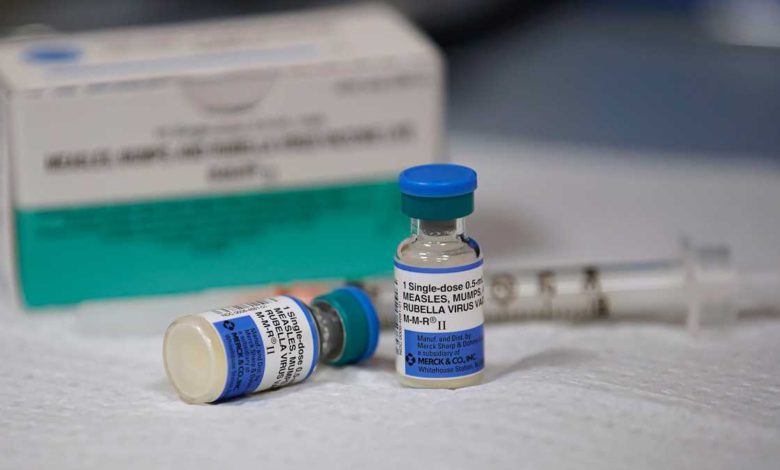

The global threat of measles has become worse after 22 million babies missed their vaccinations because of the COVID-19 pandemic, the U.S. Centers for Disease Control and Prevention warned Wednesday.Measles is one of the most contagious viruses known and still kills more than 60,000 people a year, mostly young children. But it killed more than a million a year as recently as 2000.Vaccination campaigns turned that around, but it doesn't take much to threaten any progress.The CDC said Wednesday that reported measles cases fell in 2020 after a global resurgence from 2017-2019. The agency doesn't necessarily think that's good news."Large and disruptive measles outbreaks in 2020, however, suggest that measles transmission was underreported," the CDC team wrote in the agency's weekly report on death and disease, the MMWR.The CDC notes millions of kids missed out on their vaccines because of the pandemic."Over 22 million infants missed their first dose of measles vaccine — 3 million more than in 2019 and the largest annual increase in over 20 years," the CDC said."While reported measles cases dropped in 2020, evidence suggests we are likely seeing the calm before the storm as the risk of outbreaks continues to grow around the world," Dr. Kate O'Brien, director of the Department of Immunization, Vaccines and Biologicals at the World Health Organization, said in a statement."It's critical that countries vaccinate as quickly as possible against COVID-19, but this requires new resources so that it does not come at the cost of essential immunization programs. Routine immunization must be protected and strengthened; otherwise, we risk trading one deadly disease for another."CDC and WHO have been warning that the pandemic has damaged routine childhood vaccination programs."Large numbers of unvaccinated children, outbreaks of measles, and disease detection and diagnostics diverted to support COVID-19 responses are factors that increase the likelihood of measles-related deaths and serious complications in children," Dr. Kevin Cain, CDC's global immunization director, said in a statement."We must act now to strengthen disease surveillance systems and close immunity gaps, before travel and trade return to pre-pandemic levels, to prevent deadly measles outbreaks and mitigate the risk of other vaccine-preventable diseases."The CDC estimates that measles vaccination programs prevent more than 31 million deaths a year."Even before the pandemic, we were seeing how even small pockets of low measles immunization coverage could fuel unprecedented outbreaks, including in countries where the disease had been considered eradicated. And now, COVID-19 is creating widening gaps in coverage at a pace we haven't seen in decades," Ephrem Tekle Lemango, UNICEF's associate director for immunization, said in a statement."While we have not seen an increase in cases yet, measles is simply too contagious. If we do not act, gaps will become outbreaks, and many children will be exposed to a preventable but potentially deadly disease," he added.
The global threat of measles has become worse after 22 million babies missed their vaccinations because of the COVID-19 pandemic, the U.S. Centers for Disease Control and Prevention warned Wednesday.
Measles is one of the most contagious viruses known and still kills more than 60,000 people a year, mostly young children. But it killed more than a million a year as recently as 2000.
Vaccination campaigns turned that around, but it doesn't take much to threaten any progress.
The CDC said Wednesday that reported measles cases fell in 2020 after a global resurgence from 2017-2019. The agency doesn't necessarily think that's good news.
"Large and disruptive measles outbreaks in 2020, however, suggest that measles transmission was underreported," the CDC team wrote in the agency's weekly report on death and disease, the MMWR.
The CDC notes millions of kids missed out on their vaccines because of the pandemic.
"Over 22 million infants missed their first dose of measles vaccine — 3 million more than in 2019 and the largest annual increase in over 20 years," the CDC said.
"While reported measles cases dropped in 2020, evidence suggests we are likely seeing the calm before the storm as the risk of outbreaks continues to grow around the world," Dr. Kate O'Brien, director of the Department of Immunization, Vaccines and Biologicals at the World Health Organization, said in a statement.
"It's critical that countries vaccinate as quickly as possible against COVID-19, but this requires new resources so that it does not come at the cost of essential immunization programs. Routine immunization must be protected and strengthened; otherwise, we risk trading one deadly disease for another."
CDC and WHO have been warning that the pandemic has damaged routine childhood vaccination programs.
"Large numbers of unvaccinated children, outbreaks of measles, and disease detection and diagnostics diverted to support COVID-19 responses are factors that increase the likelihood of measles-related deaths and serious complications in children," Dr. Kevin Cain, CDC's global immunization director, said in a statement.
"We must act now to strengthen disease surveillance systems and close immunity gaps, before travel and trade return to pre-pandemic levels, to prevent deadly measles outbreaks and mitigate the risk of other vaccine-preventable diseases."
The CDC estimates that measles vaccination programs prevent more than 31 million deaths a year.
"Even before the pandemic, we were seeing how even small pockets of low measles immunization coverage could fuel unprecedented outbreaks, including in countries where the disease had been considered eradicated. And now, COVID-19 is creating widening gaps in coverage at a pace we haven't seen in decades," Ephrem Tekle Lemango, UNICEF's associate director for immunization, said in a statement.
"While we have not seen an increase in cases yet, measles is simply too contagious. If we do not act, gaps will become outbreaks, and many children will be exposed to a preventable but potentially deadly disease," he added.
Source link






